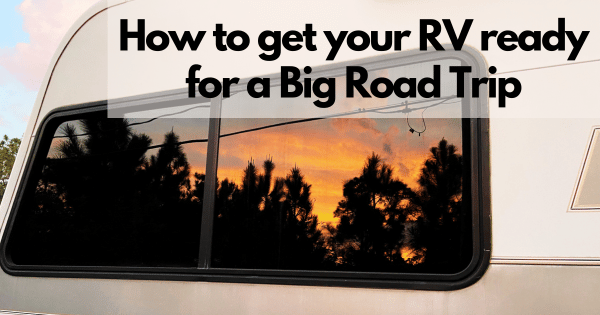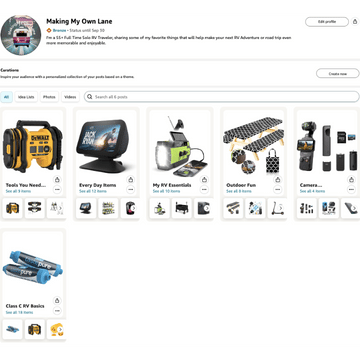How to Get Your RV Ready for a Big Road Trip

Written by Nancy Carter, Marking My Own Lane
This article contains affiliate links. We will make a commission when you make a purchase at no cost to you, but it helps me buy gas ⛽️ for my travels! Thanks for your support.
How to get your RV Ready for a Big Road Trip
Getting your RV ready for a big road trip takes a lot of preparation, at least for me.
Because I travel alone, I probably take extra precautions to ensure that my trip goes as smoothly as possible.
There will almost always be unexpected things that come up, whether it’s something that needs to be fixed, or plans that need to change because of the weather or because you find a new, amazing place you want to stop.
But that’s part of the adventure!
Here are the six things that I do for my RV pre-trip checklist.
Maintenance
Maintenance is something I try to keep up with once a month. This helps to keep unexpected repair costs at a minimum, and it helps to keep everything in my RV running smoothly.
I live in my RV full-time, so I treat it like I would if I lived in a house.
1. Inspect - look closely at the outside of your rig for anything that is loose or not up to travel standards.
I usually do this, and have a professional verify, when I get my RV washed bi-yearly.
Because I have so much solar on the roof, I don’t like going up there. There isn’t a lot of room to walk!
2. Wash - 2x a year. When I first heard this, I thought I heard wrong. Yes, a good top to bottom, back to front washing 2x a year is all you really need.
Whether you do it or you have someone else do it, I usually have it done in the spring and in the fall.
3. Seals - body and roof. Once your rig is cleaned, this is the time to check all the seals, and replace the caulking if needed.
Spring and fall are a good time to do this, too, because the cooler weather allows the caulk to set properly.
This year is my first year owning my 2005 Class C Lazy Daze, so I am having all of the caulk replaced on the body and the roof this spring, and I plan on having all the windows caulked either in the fall, or next spring, depending how many other repair expenses come up this year.
The windows were redone more recently than the body, and sometimes you just have to pick your battles.
But, do not wait until you have a leak to take care of the caulk. Water leak damage can be very expensive to repair, so be proactive.
I also carry caulk and RV roof sealant tape with me, just in case.
4. AC - inspect and clean filters. I clean my AC filters once a month, just like I would in a house. Dirty air filters will greatly reduce the efficiency of your AC and may cause your AC to freeze up.
Because I live in Florida, I pretty much run the AC year round.
5.Slide outs and steps - I don’t have slide outs, but if you are lucky enough to have them, inspect them regularly to make sure they are clean and working properly.
It’s the same with your steps. My steps just pull out manually and lock in place with a pin, but I give them a little lube to make sure they go in and out easily.
6. Sanitize fresh water tanks - Some people say you only need to do this twice a year, but because it is very easy to do and I live in my RV full time, I do it once a month.
I drain my fresh water tank completely, add about one half cup of bleach, fill the tank about half way full, and drive to my next destination.
The sloshing of the water when I travel cleans the tanks.
When I get where I am going, I completely empty the fresh water tank again, and then fill it about ⅔ full with clean water.
The reason I keep that much water in my tanks is because, occasionally, actually regularly, a park I am in may have to shut off the water. In the beginning, I found this surprising. Now I expect it.
Sometimes you have warning, and sometimes you do not. This way I always have water, no matter what happens in the park.
7. Flush the hot water heater and replace anode if applicable. This stops calcium from building up in your hot water tank and keeps it working properly
8. Fill your propane tanks. It’s usually pretty easy to find propane along the way; however, I don’t let my tanks get below ½. I use my propane for cooking, running the refrigerator if I am boondocking, heating water for dishes and showers, and occasionally to run my heater.
9. Check fire extinguishers - make sure you have them, know where they are and how to work them, and that they are not expired.
10. Check the tires - make sure they are inflated properly, not cracked or split, and not too old. Some people say tires can be good for up to seven years, but I plan on replacing mine at the five-year mark, no matter how much mileage they have, or don’t have, on them.
Also, make sure your spare is in good working order.
11. Replace wipers - I do this once a year, whether they need it or not. Because if I don’t, I know I will regret it about half way into the trip.
12.Change oil and check the air filter - Before a big trip, I change my oil, even if it’s not due. This means I usually change my oil twice a year.
That way I don’t have to worry about getting it done during my travels.
I change out the air filter as well. I was amazed how dirty that can get after a big trip.
13. Check the fluids - top off all your fluids, and carry extra fluids with you, just in case.
14. Inspect hoses - make sure that they are not loose or cracked.
15. Inspect screws and rivets - remember, driving your house on wheels on bumpy roads has the effect of a small earthquake on every travel day. Things come loose, screws fall out, both inside your rig and out. Stuff happens!
16. Weigh your rig and tow vehicle - is your RV too heavy? Is your tow vehicle within the tow weight your RV can handle? Not staying within your guidelines can not only damage your RV, it can put the safety of you and your passengers at risk.
17. Clean your sink and shower drains - this is such a small maintenance item, but it makes a big difference and can help avoid back ups, especially since I don't have a black tank!
I just add some baking soda to the drain, top it off with white vinegar, let it sit for about 15 minutes, and flush with hot water. It helps to keep my drains clog free and smelling fresh.
18. Defrost your freezer - if you look at the back of your freezer, you may notice a coating of ice.
When I lived in a house, I didn't have to defrost my freezer. But in an RV, I do.
I usually only have to do this two, maybe three times a year, but it is a maintenance item for me that I do before I leave for each big roadtrip.
Empty out your refrigerator and your freezer into a cooler or a friends freezer for a couple of hours. I try to do this when I am house-sitting for someone so I don't have to worry about my food going bad.
Turn off your refrigerator and let it sit a couple of hours with the doors open. This is usually enough time for any ice to melt.
Before putting the food back, I wipe down the insides and disinfect them, turn the refrigerator back and let it sit overnight, then put the food back in. This helps to make sure that the unit is cold enough to keep your food safe.
Food and Supplies
Stock your pantry.
Food
I like to have enough food for 2 weeks. It can be incredibly stressful and frustrating to try and find the foods you like in new grocery stores in different states.
It was one of my least favorite things about traveling. Grocery shopping would take me twice as long because I wouldn’t know where anything was in the store, and every grocery shopping trip was in another new grocery store.
I also like to have a one month supply of pet food, because the food your pets are used to can be even harder to find than the food you like to eat.
Another thing I like to do is have a few frozen meals meal-prepped for travel days. This means I can just enjoy my stop and rest, instead of having to worry about what to eat, and possibly eat food that isn't necessarily the healthiest food for me to eat.
Water
On top of having some water in your newly sanitized fresh water tank, it is a good idea to have a few gallons of bottled water available. I carry a one gallon container for every passenger, human or pet.
You may get to a campground, only to find the water is off in the park, or there is a boil water notice.
Medications
Carry enough medication/prescriptions for at least a month for both you and your pets.
It can be difficult to refill one state's prescriptions in another state, so be sure to ask your pharmacy any questions before you leave for your trip.
Planning
Have a copy of your itinerary with a map and directions for each day, in case the internet decides to be non-existent during the day.
Also have your reservation numbers for your campsites and copies of the reservations.
I use Roadtrippers to plan as many stops as I want, share my trip with family and friends, and know that I will be safe on my travel days with RV-friendly GPS. You can learn more here and try if for free for 7 days!
Mail and Finances
Know how to access your online finance and business accounts.
Confirm that your mail plans or mail service is working properly.
Your Toolbox
Do you have any tools you would need for quick repairs on the road, including a tire iron, bottle jack, hammer, wrenches, duct tape, and zip ties.
I'm not mechanically savvy, but these items have helped. Duct tape fixes everything, at least temporarily, right?
Tolls
I use UNI. It's a toll pass that works in 19 states, including Florida, Georgia, North Carolina, Virginia, Kentucky, West Virginia, Maryland, Delaware, New York and Maine.
It works anywhere an EZ Pass would, including most bridges.
You can save up to 33% on tolls, link it to your EZ Pass account, and move in from vehicle to vehicle.
No more wating in long toll lines, or get a pay-by-plate bill in the mail.
Click here to learn more about UNI.
Insurance and Roadside Assistance
Have a copy of your itinerary with map and directions for each day, in case the internet decides to be non-existent during the day.
Also have your reservation numbers for your campsites and copies of the reservations.
If you have any comments, suggestions or questions about preparing yourself, and your RV, for taking an extended road trip in your RV, click here.
Thanks for joining me as I explore more in this full-time RV life.
Subscribe below for updates as we travel and continue to learn more about life on the road.
Thank you for subscribing!
Have a great day!
Other posts you might like:

Hi there! I'm Nancy.
In 2023, I ditched my heels for hiking boots, sold my house, and decided to travel the US full time in my 2005 Lazy Daze Class C RV.
I love to share the places I travel to and what it's like to live in an RV full-time.
If you have ever thought about hitting the road and traveling in an RV, either in your free time or full time, you are in the right place!
Follow along for weekly blog posts about my adventures as I travel the US with my two dogs, Rufus and Willie, and my cat, Katie.
